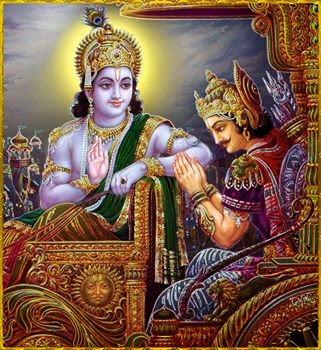Gita : Ch-2. Slo-56.
Srimad Bhagavad-Gita :
Chapter-2. ( Samkya-yogam )
Slokam-56. { One who is not disturbed in spite of the threefold miseries, who is not elated when there is happiness, and who is free from attachment, fear and anger, is called a sage of steady mind.}
Duhkheshvanudvignamanah sukheshu vigatasprhah,
Vitaragabhayakrodhah sthitadhirmunirucyate.
duhkheshu = in sorrows;
anudvignamanah = one who with steady mind ( balanced mind, unshaken mind, );
sukheshu vigatasprhah = not interested in happiness ( no desire for happiness );
vitaragabhayakrodhah muniah = free from attachments, fear, anger, ( one ) the muni ( Jnani );
sthitadhirmunirucyate = is called as "Sthitah-prajnan" ( A person with above qualities ).
The Supreme Lord Krishna continuing the answer to the first question of slokam- 54 states that: He who is unperturbed, who is free from desires though amidst pleasures is not agitated even upon being put into misery because there is the absence of any attachment, affection, fear or anger. Thus by being devoid of all these characteristics one can be understood to be a person of steady wisdom.
Lord Krishna gives an expansion of this in the next three slokam-s. For those situated in wisdom these instructions are essential being the means. It has been declared that whatever instructions have been recommended for those seeking advancement, these selfsame instructions are seen distinctively in the actions of those situated in wisdom. To assume erroneously that something is pleasant then it becomes a source of attachment. Rasa sentiment, raga attachment and rakti beauty are said to be erroneous assumptions.
These characteristics Lord Krishna mentions are all within the purview of self-experience. How could others recognise such an inner state. To this he states undisturbed in sorrow. There are three types of sorrow or pain: adyatmika or physical, adhidaivika or supernatural and adhibhautika or natural. Adyatmika is pain of the body and pain of the mind. The pain of the body is diseases and ailments attacking it such as fever, rheumatism, gout, etc. The pain of the mind is due to insult, jealousy, shame and the like. Adhidaivika is pain caused by drought, flooding, cyclones, earthquakes, hurricanes, etc. Adhibhautika is pain caused from people, demons, animals, ghosts, etc. All these three are destined by fate and as such are not transitory and after experiencing them they fade into oblivion. Determining in this way that those whose minds remain unperturbed in affliction coming due to fate as well as in happiness rising up by chance, these beings have become devoid of desires in whatever results occur. The reason is they are free from passion, fear and anger. Passion is the extreme mental attachment to objects cherished with intense desire with the intention of never letting possession of these objects be discontinued. Fear is the pain caused from the approaching agony arising from separation from what is cherished. Anger is a specific mental attitude which appears in one who experiences separation at the time of loss of cherished objects. These three passion, fear and anger all arise due to the lack of discrimination regarding the eternal nature of the soul. By the gradual development of this discrimination one becomes free from these three impediments and by this discrimination when the introspective one's contemplation becomes mature they're known as sthita-prajnan.
To be free from an agitated mind is not to become aggrieved when situations arise of impending affliction and difficulty or bereavement for something cherished and lost. To not be elated in happiness is to remain in an unattached and passive state even when joyous events occur. Desire is the longing for things not obtained. One must learn to be free from this. Fear is worrying for prospective sorrow which may be caused by bereavement of what is cherished and the projection of the coming of unwanted things. One must learn to be free from this. Anger is that disturbed state of mind and irritated feelings produced of pain from others causing separation from what is cherished or giving the experience of things not cherished. One must learn to be free from this. Such a being is a muni or one of profound contemplation on the soul. This being is known as sthita-prajna situated in perfect knowledge of transcendental consciousness. Lord Krishna describes the next lower stage in the next slokam.
To be continued ..

.jpg)



Comments
Post a Comment